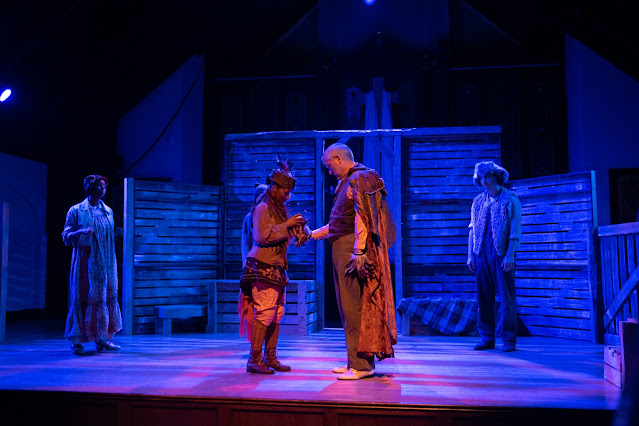A Barn Play
Written by Lizzie Donahue
Directed by Leslie Kincaid Burby
729 W. 181st St., Manhattan, NYC
May 4-21, 2022
 |
| L to R: Denisse Estefany Mendoza, Erin Nelson, Ariel Blake, Adam Burby, Mary Albert. Photo by Amy Milstein |
Other issues with the Chick-fil-A organization aside, its advertising campaign involving cows exhorting people to "Eat Mor Chikin" has always seemed far more disturbing than funny, evoking the cows' awareness of and desperation to avoid industrial murder even as their misspelling obliquely justifies it because they're just dumb animals anyway. Lizzie Donahue's A Barn Play asks that we take seriously the mental and emotional lives of the cows, chickens, and other non-human animals whose reduction to mere commodities is so culturally ingrained (helped, of course, by plenty of costly lobbying and advertising). A program note from the Artistic Director at the time of A Barn Play's intended 2020 debut, canceled due to lockdown, observes that the society of the animals who live on the play's farm "all too clearly resembles the one that we see on our streets and at our borders," leaving open the possibility of identifying parallels with, say, America's engagement in family separation (a reference to reproductive choice also drew an audible reaction from the May 2022 audience), but it also asserts that the work is neither allegory nor parable. As complex individuals, the non-human animals who populate A Barn Play do not need to be interpreted as symbols of humanity; their lives and stories have poignancy and value in their own right.
 |
| L to R: Denisse Estefany Mendoz, Adam Burby, Rik Walter. Photo by Amy Milstein |
The title of
A Barn Play quickly reveals itself to refer both to the production itself and to the diegetic play which its cast of non-human farm animals are rehearsing. Owl (Rik Walter) is the playwright and director and Chicken (April J. Barber) his stage manager. The themes of his play, with its suggestive references to looking for connection and towards the end, are overwhelmingly lost on his cast, who are as interested in engaging in play as in putting one on and prove challenging to keep on task. Dog (Adam Burby) and Cat (Denisse Estefany Mendoza) are very young, living through their first winter (literally and perhaps metaphorically), and their youthful energy informs their fast friendship. Sheep (Mary Albert), though young enough to be a first-time mother, is perhaps too well-behaved to make a third in that canine-feline duo. Pig (Ariel Blake), who views herself as Owl's intellectual rival, and Cow (Erin Nelson) represent the group's more experienced voices. As external forces come to interrupt the day's rehearsal, what will be a seismic shift in how they conceive the world for some will be for others one more turn of an indefensible but seemingly inevitable cycle.
 |
| L to R: Ariel Blake, April J. Barber, Rik Walter, Adam Burby. Photo by Amy Milstein |
Freedom and privilege vary according to what use the "cruelty-free" farmer has for a given species: Owl can exercise choice with comparatively little restraint, for example, and Cat and Dog are less likely, although not necessarily immune (especially in Cat's case), from the type of trauma experienced by Cow, Sheep, and Pig. Even, or maybe particularly, in this context, the unknowability of the Other–just as the others can't know what it is like to soar through the sky, Owl can't know what it is like not to fly–doesn't preclude cross-species empathy, and should not for humans, either, including that for non-human animals that are neither "cute" nor "pets."
A Barn Play doesn't position empathy as a cure-all for powerlessness–or theater for trauma–but it does leave the door open a crack, including in a climactic choice that Chicken asks Owl to make. The production builds tension skillfully and subtly–a look or a word from Cow, a deflection from Owl–amidst the engaging early comedy and smartly keeps humans offstage, wholly investing us in our non-human protagonists. The costumes suggest the different species, leaving the rest to the evocative physicality of the actors' performances, from Albert's prim steps as Sheep to a terrific Burby's enthusiastic sprints through the venue as Dog to the way that Blake suggests strength and solidity in how she carries herself as Pig. Each character is an individual, rather than a representation of a species, whether Mendoza's excitable, attention-seeking Cat, Walter's avuncular, conflicted Owl, Nelson's soberly mournful Cow, or Barber's wonderfully layered Chicken, whose clipboard and ramrod posture belie a willingness to think radically outside the coop.
There's a bit of an existentialist feel to the conditions under which the characters in A Barn Play live that creates an indelible juxtaposition with their capacity for love and joy.
A Barn Play is likely to stay with you long after you leave "the barn." And if you're planning on grabbing dinner afterwards, make it somewhere vegetarian.
-John R. Ziegler and Leah Richards



Comments
Post a Comment